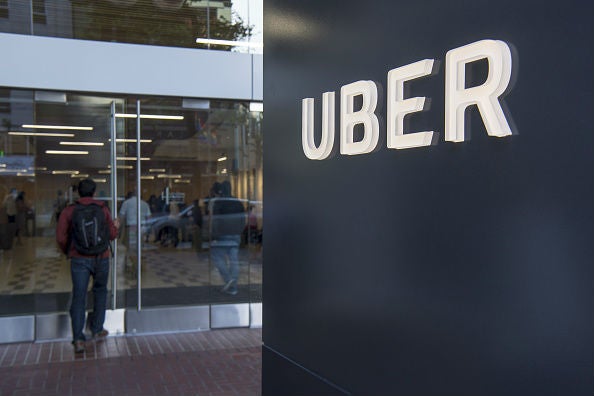We got an Uber to Uber's Silicon Valley HQ to ask them about getting banned in London
A view from Uber's home turf

As morning rush hour descends on downtown San Francisco, sending streams of tech workers to their gleaming office spaces, it can seem like every third car has an Uber sticker in the windshield.
The distinctive cutout circle logo could soon be a rare sight in London, where the municipal transit agency, Transport for London (TfL), revoked Uber’s license with a statement upbraiding the company’s “lack of corporate responsibility”. It was the latest barrier to a foreign market for a company with global ambitions.
But here in the tech titan’s hometown, Uber rides remain ubiquitous. On a brisk San Francisco morning, The Independent caught a ride to headquarters to try and gauge how the London decision was playing out.
After some confusion navigating the tangled streets of downtown, a car pulled up a short distance from where the Ferry Building gazes out across the San Francisco Bay toward Oakland. The driver, decked out in a full-body black-and-white tracksuit, was happy to chat.
As Uber has become a common source of employment, some workers have begun decrying what they call a lack of job protections. Lawsuits have challenged Uber’s practice of designating drivers as independent contractors rather than full-time employees who can draw benefits, and a Washington state judge recently dealt Uber a blow by backing a law allowing Seattle drivers to unionise.
None of that seemed to bother Abebe, who moved to California from Ethiopia 13 years ago. The father of two said he drives for a couple of hours in the morning to supplement his pay as a security guard.
Uber controversies
Show all 4“Instead of watching TV, it’s better to work”, Abebe said as he paused at an intersection clogged by a bus and two cars, both of the latter sporting Uber and Lyft decals. The freedom to work a little when he chooses, he said, “is all for the driver’s advantage”.
In Abebe’s view, Uber is ascendant both for riders - “most people, instead of taking taxis, they use Uber”, he noted - and for drivers. Many of his fellow Ethiopian immigrants drive Uber full-time, he said.
“The newcomers, immediately they lease their cars and they start to drive," he said. When The Independent noted that driving taxis is often an entry-level job for new immigrants - in Washington DC, home to large Ethiopian and Eritrean populations, it’s common to hop in a taxi driven by someone from one of the two countries - Abebe said there was little difference.
“Taxi, Uber, whatever," Abebe said, though he argued Uber affords more security than other jobs - a contention that might be disputed by former drivers who have complained about bad ratings unfairly getting them booted.
Abebe departs with a handshake after pulling up to Uber headquarters. In a lobby thick with arriving employees, a receptionist politely rebuffs an interview request - no appointment. (In London, Tom Elvidge, Uber’s general manager there, told reporters that TFL and the city’s mayor, Sadiq Khan, had “caved in to a small number of people who want to restrict consumer choice”.)
The company has received plenty of media attention lately, much of it unfavourable. It became a poster child for Silicon Valley sexism after a former employee published a viral blog post describing frequent harassment. After commissioning a report from a high-power law firm, led by former US Attorney General Eric Holder, to look into allegations of sexism, the company saw a board member resign for making a sexist remark during a meeting presenting the report.
It endured a fresh round of censure this week after its India division sent a note to customers suggesting ordering food via UberEats so wives could “take a day off from the kitchen”, again plunging the service into trouble for its conduct in India. An Uber executive resigned earlier this year after it was revealed he had obtained the medical records of a woman whose rape during a ride in India led the service to be temporarily banned in New Delhi.
A leadership fight has complicated matters. After CEO Travis Kalanick stepped down, an early investor launched a legal battle to try and dilute Mr Kalanick’s sway over the company’s board.
Subscribe to Independent Premium to bookmark this article
Want to bookmark your favourite articles and stories to read or reference later? Start your Independent Premium subscription today.

Join our commenting forum
Join thought-provoking conversations, follow other Independent readers and see their replies